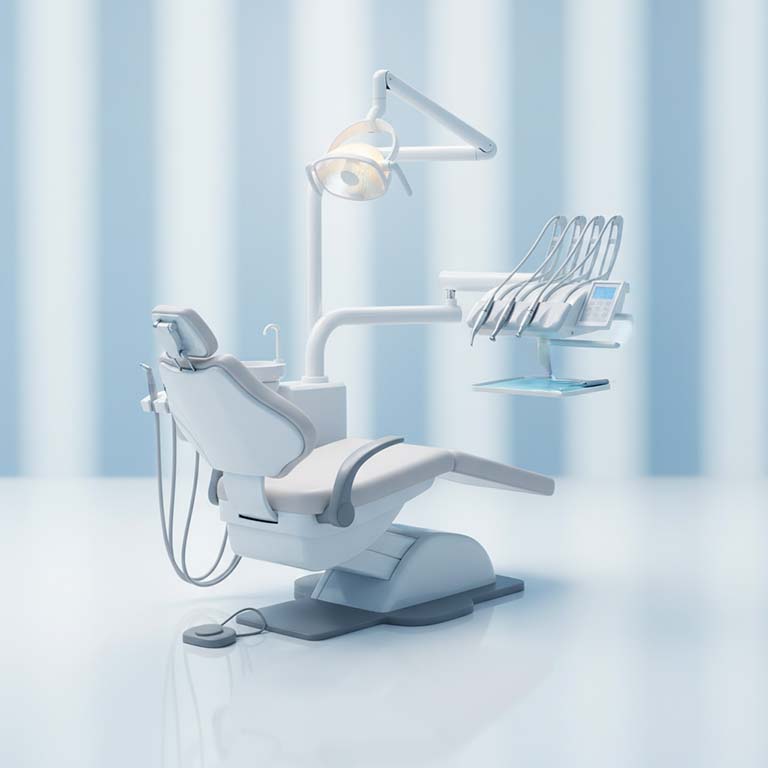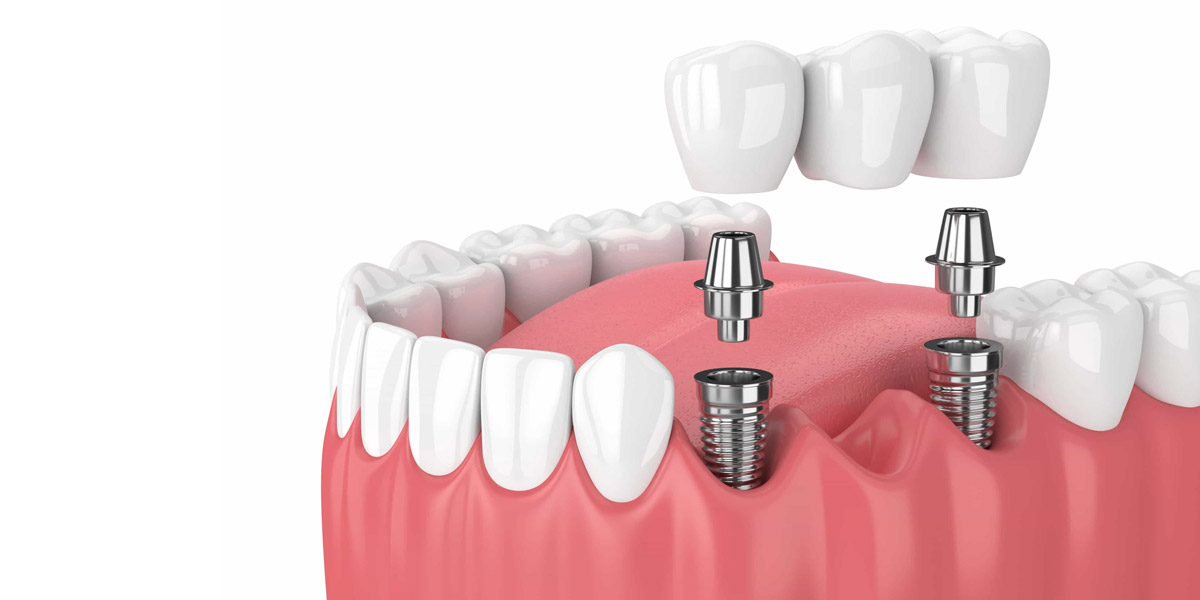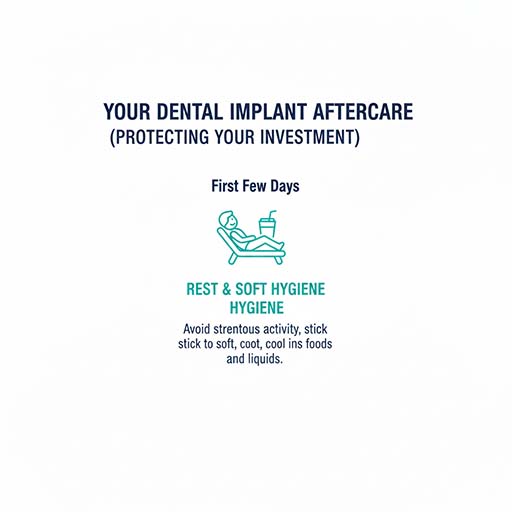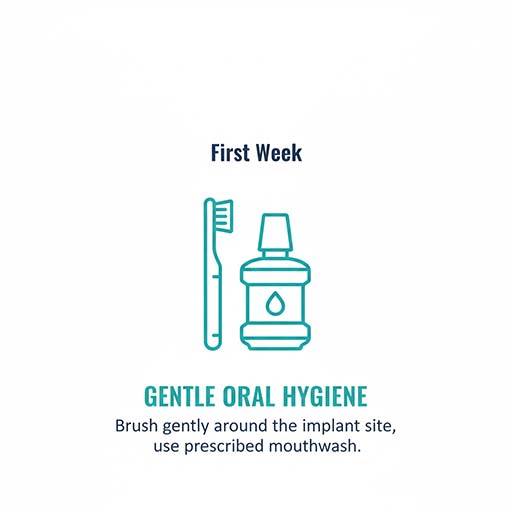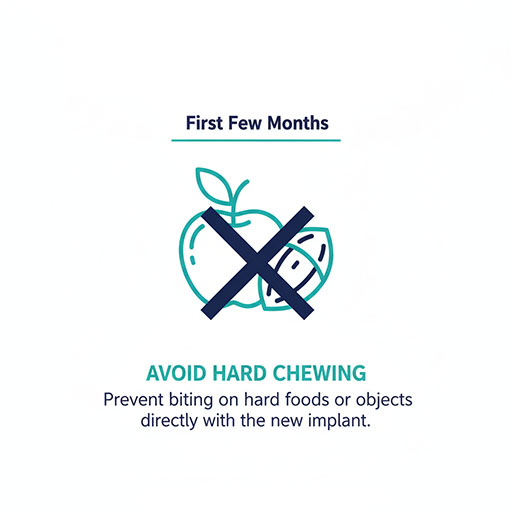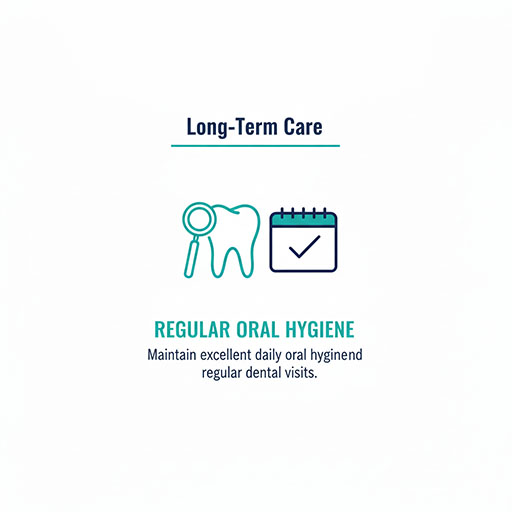Restore your smile with expert care. Transparent pricing, no hidden fees. Medically reviewed for your peace of mind.
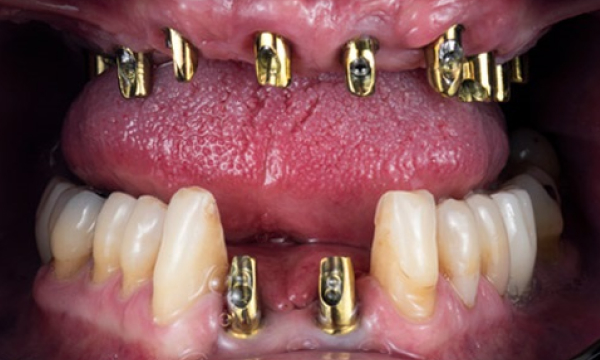
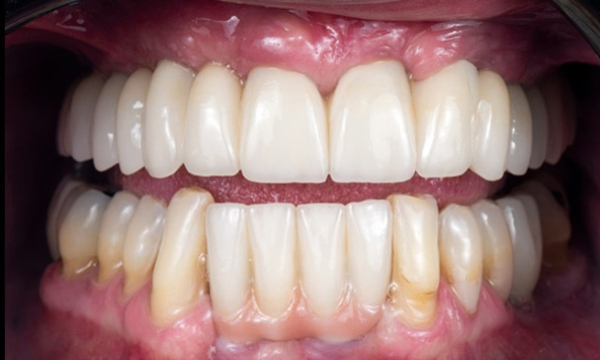
You’ve probably heard people call them 'teeth implants' – it's a very common term here in the UK. Dentists call them 'dental implants', but they mean the exact same thing.
Put simply, it’s the gold-standard permanent solution for replacing a missing tooth.
Think of an implant as a new, artificial tooth root. It’s a tiny screw, made from medical-grade titanium, that a specialist dentist gently places into your jawbone. Over a few months, your bone naturally fuses with this screw, creating a super-strong, permanent base.
Once that's solid, a small connector is attached, and the specialist fits your new, custom-made crown on top. The crown is the part that looks just like a real tooth. The final result is a replacement that looks, feels, and works exactly like your natural teeth.
Your smile is one of a kind. That’s why we don't believe in 'one-size-fits-all' treatments. At Cure Voyage, we connect you with top-tier dental specialists who will recommend the perfect solution for you after your free consultation.
If you're missing just one tooth, this is the ideal solution. The specialist places one implant to act as the new root, which then holds a single new crown. The big advantage is that they don’t need to touch or file down your healthy teeth on either side, which is what happens with an old-fashioned bridge.
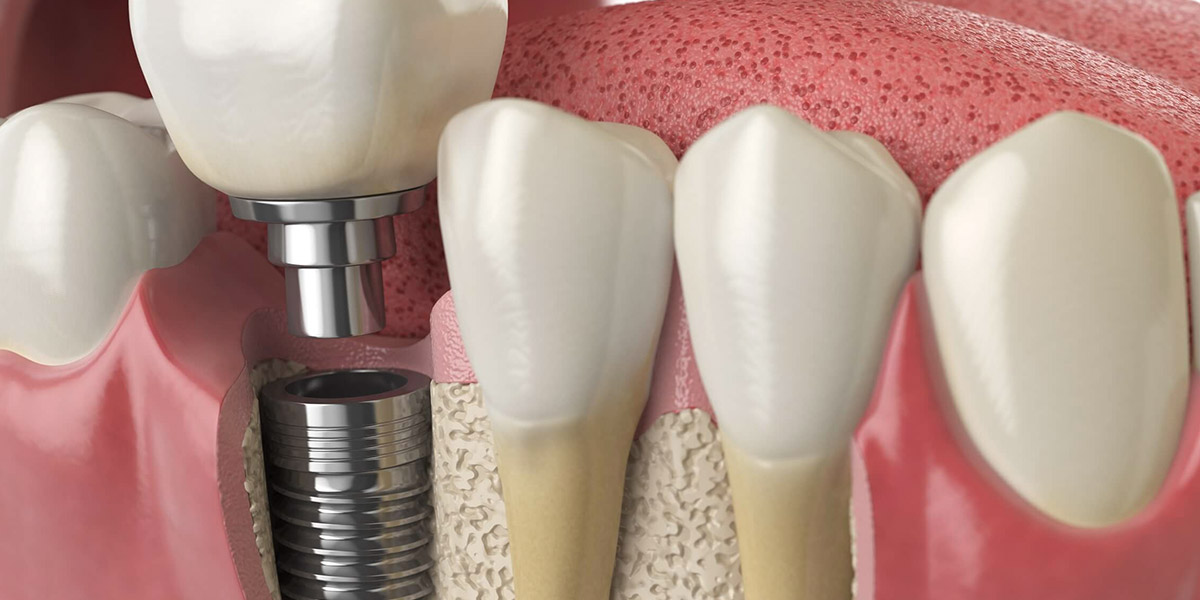
This is a truly life-changing option if you've lost most, or all, of your teeth. The All-on-4 system uses just four (or sometimes six or eight) implants to support a full, permanent set of new teeth. It's less invasive and a much more cost-effective way to get a full mouth of dental implants in Turkey.
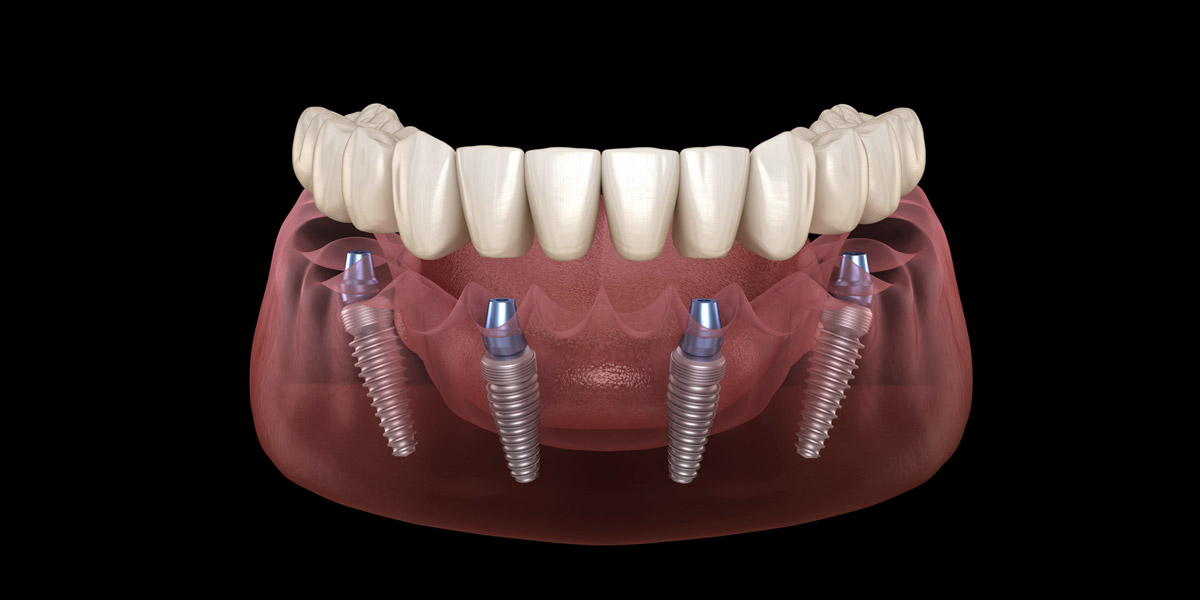
Most implants are made of Titanium. It's the industry standard, trusted for decades. It's incredibly strong and your body accepts it perfectly.
Our partner clinics also offer Zirconium implants. These are a 100% metal-free, white-coloured alternative. They are a brilliant option for patients who may have a metal allergy or very thin gums.
This is just a simple guide. Your specialist will give you a clear recommendation during your free online chat.
| Single Tooth Implant | All-on-4 / All-on-6 (Full Arch) |
| Best for: 1-2 missing teeth. | Best for: A full jaw of missing teeth. |
| Method: 1 implant per tooth. | Method: 4-6 implants support the entire arch. |
| Cost: Priced per tooth. | Cost: Priced per arch (as a package). |
Our main job is to find you top-quality dental care for a fair and honest price.
It's true, the dental implants turkey cost is a lot lower than what you'd pay back home in the UK. This isn't because the quality is lower – not at all. It's simply because the cost of running a top-spec clinic is cheaper in Turkey.
You receive treatment from 10+ year specialists using the exact same global brands you'd find in London or Manchester.
| Treatment | Average Turkey Price | Average UK Price |
| Single Dental Implant (Titanium) | £400 - £700 | £2,500 - £4,000 |
| All-on-4 Dental Implants (per jaw) | £3,200 - £5,300 | £12,000 - £18,000 |
This is our commitment to transparency. Your full mouth dental implants turkey price quote from our partners includes everything for your medical procedure. No hidden fees, no surprises.
| Dental Implant Treatment Prices in Turkey | |
|---|---|
| Consultation | Free |
| Panaromic X-ray | Free |
| Dental Tomography | Free |
| Examination | Free |
| Local Anesthesia | Free |
| Osstem Dental Implant | £ 399 |
| Bego Dental Implant | £ 499 |
| Alpha-Bio Dental Implant | £ 499 |
| Nobel Dental Implant | £ 699 |
| Straumann Dental Implant | £ 769 |
| Tooth Extraction | £ 30 |
| Complicated Tooth Extraction | £ 40 |
| Sinus Lifting | £ 499 |
| Bone Grafting | £ 499 |
We focus on your medical care, giving you the freedom to book your own travel. We are happy to assist you with:
The "4 Simple Steps" you saw above cover your customer journey. Before diving into the specifics, we encourage you to read our complete guide on the pros and cons of getting dental implants in Turkey.
Below is the detailed medical process you can expect from the specialists.
Your first short trip to Turkey is all about creating the foundation.
You will return home and let biology work its magic. During this time, your jawbone will fuse with the titanium implants (osseointegration), creating a rock-solid foundation. Your temporary teeth allow you to eat and smile normally.
You return to Turkey. The clinic team will take final impressions, and their in-house lab will craft your final, permanent crowns or bridges. Your specialist will fit them perfectly, check your bite, and polish them. You will leave the clinic with your permanent, confident, new smile.
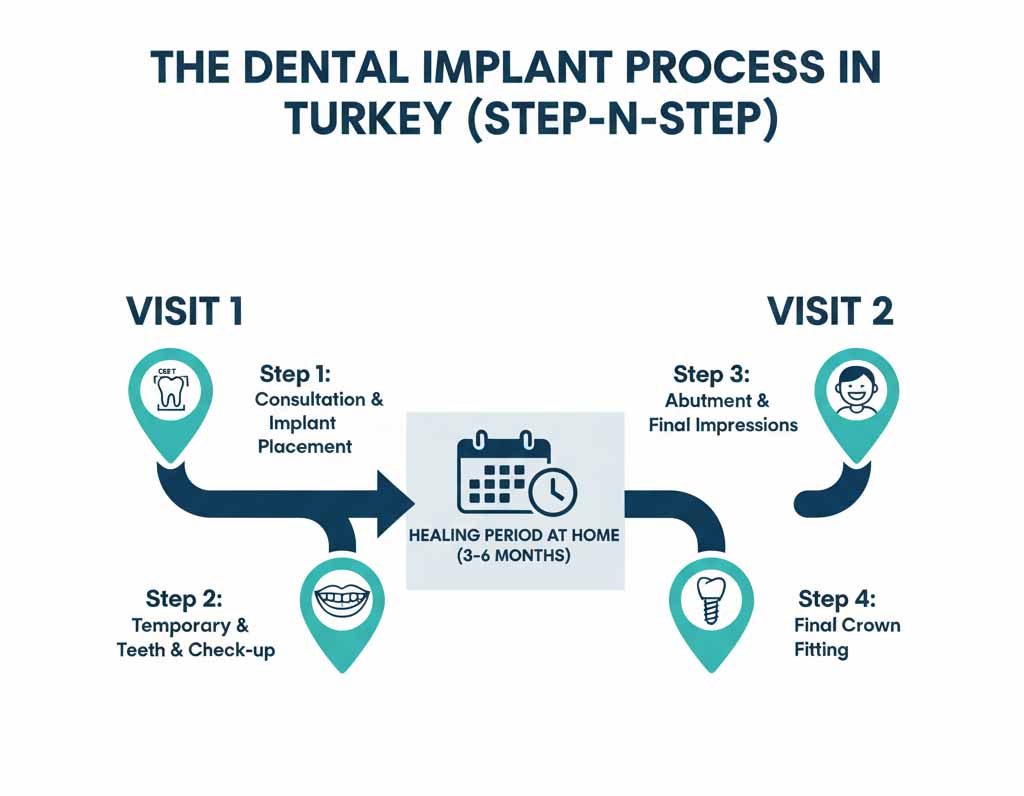
Implants have a success rate of over 98%, but they aren't for everyone.
This is a common question. The answer is simple:
A Dental Implant replaces a completely missing tooth (including the root).
A Dental Crown covers or caps a damaged or weakened existing tooth.
If your natural tooth root is still healthy, a crown may be all you need. If the root is gone, you need an implant.
![]()
A new smile is a new beginning. See the real-life transformations and hear from patients who trusted Cure Voyage to find their specialist for dental implants in Turkey.
See how Adam transformed his smile with All-on-4 implants, even after bone loss required all his teeth to be extracted.
Every case is unique: Discover how Jonah's upper jaw was restored with a customised treatment plan involving 5 implants.
Isabel loves visiting Turkey for her holidays and trusts our partner specialists for her dental care. She has already completed two implant treatments during her trips, and her third implant is now planned for Spring 2026.
At Cure Voyage, your health and safety are our highest priorities. All information on this page has been reviewed and verified for medical accuracy by a qualified dental professional to ensure it is trustworthy, up-to-date, and reflects the highest standards of care.
Dr. İsmail Eser Bolat (Oral and Maxillofacial Surgeon)
This article has been medically reviewed and approved by Dr. İsmail Eser Bolat, an Oral and Maxillofacial Surgeon.
Dr. Bolat graduated from Ankara University, Faculty of Dentistry, in 2013, bringing over 12 years of experience to his practice. He completed his specialty training in Oral and Maxillofacial Surgery at Kırıkkale University.
Furthering his international expertise, Dr. Bolat received advanced training in Oral and Maxillofacial Surgery at the Mayo Clinic School of Health Sciences in the United States in 2019.
Connect with Dr. Bolat on: LinkedIn
Your new implants can last a lifetime, but they require the same care as natural teeth.
Do: Rest, apply cold packs, eat only soft foods (soup, yoghurt).
Don't: Smoke, drink alcohol, or rinse your mouth vigorously.
Do: Begin gentle rinsing with warm salt water after 24 hours.
Do: Brush your other teeth normally, but be very gentle around the implant site.
Don't: Eat hard, crunchy, or sticky foods.
Do: Brush twice daily and floss once daily (a water flosser is excellent).
Do: Use a soft-bristled toothbrush and non-abrasive toothpaste.
Don't: Chew ice or open packages with your teeth.
Do: Visit your local dentist back in the home town for regular 6-month check-ups and cleanings, just as you would for natural teeth.
We do our best to ensure that our patients' dental treatments are comfortable. Keeping their satisfaction at the highest level is very important to us.
Please fill the form, we will contact to you for online dental consultation.
Feel free to contact us
for better help and service
In very rare cases, the dental implant may not fuse to the bone. In such cases, it is possible to wait for a while for the bone to heal and reperform implant treatment. If pain and inflammation occur in the area after the dental implant, the implant may not have fused to the bone. The implants should be removed by the dentist and the bone should be expected to heal.
You need to follow some rules after dental implant treatment, this directly affects the success and lifespan of the treatment. You can find detailed information about what to do after dental implant treatment on our dental implant treatment page.
The process is simpler and more organized than you might think. We guide you through every step:
Want to see exactly what happens day-by-day? Read our detailed guide: A 5-Day Dental Implant Journey in Turkey
Dental bridge can be applied as an alternative to dental implant treatment. However, in this case, tissue loss will occur due to the cutting of neighbouring teeth. In addition, the root of the tooth on the jaw will remain empty and will lead to bone loss over time. In completely toothless mouths or toothless areas, denture can be applied as an alternative.
Dental implant prices may vary according to the brand of dental implants and the experience of the practitioner. You can visit our price page or dental implant treatment page to review dental implant prices.
Dental implant treatment is more expensive than restorative treatments. Therefore, it will be more beneficial for people to take good oral care and visit the dentist regularly. If tooth loss has occurred for some reason, implant treatment should be applied, if not, it may cause more costly problems.
It is not possible to fix the old total denture with implants. After dental implants are applied, a suitable new denture is produced and placed.
The dental crown over the dental implant is painless. The impression is taken and sent to the laboratory. The produced tooth is placed on the spacer on the implant. Local anaesthesia can be applied according to the decision of the dentist.
A dental crown should be placed on the dental implant after the healing period that your dentist finds appropriate. The healing period will last approximately 3 months if no additional surgery has been performed on the implant. After the healing period, it is recommended to make prostheses without wasting much time.
f oral hygiene is constantly well maintained, reliable brand implants have an average lifespan of 20 to 25 years. It is possible to re-implant the implant after the bone has healed, supported with bone powder if necessary, instead of the implant whose life has expired in a healthy way.
A dental implant fused to the jawbone does not cause pain. As a result of researches, it has been determined that titanium material has high compatibility with human tissue. If pain is experienced after the dental implant is applied, the implant may not have fused to the bone.
As long as the dental implant fused to the bone is healthy, it will not fall out. If the prosthesis made on the implant is applied incorrectly or if bone resorption occurs due to a different reason, the dental implant fused to the jawbone may fall out.
Immediately after the treatment, nothing should be eaten or drunk until the numbness in the area disappears. Afterwards, soft foods that are not hot should be consumed. Even if the healing of the gum is completed, hard foods should not be chewed in the implant area.
Dental implants placed where the root of the missing teeth is in the jaw heal in an average of 3 months if no additional surgical procedure is performed. Additional surgical procedures will prolong the healing time.
A dental implant is a titanium screw that is placed where the root of the missing tooth is located on the jaw and fulfils the function of an artificial tooth root. A dental prosthesis is made on it and it is the closest treatment option to the real tooth form.
If there is no infection in the tooth root, implant treatment can be applied immediately after tooth extraction. If there is an infection in the tooth root, a healing period of approximately 15 days supported by medication is expected.
People who decide to have dental implants should definitely do a brand research. Because the experience of dental implant companies and their innovation investments increase the quality. The certificates of dental implant brands should be checked. Dental prostheses are bonded onto dental implants with parts. Therefore, global brands should be preferred. If the dental prosthesis needs to be replaced, parts can be easily obtained.
It is a treatment model in which 4 or 6 dental implants are placed at right angles to the jaw bone and fixed dental prosthesis is made on it, avoiding areas with little bone in the jaw structure and areas where the sinuses are not suitable.
According to the evaluation of the dentist, if there is enough bone, the implant can be supported with bone graft. If there is not enough bone or no bone at all, it is possible to have a dental implant with advanced surgical interventions.
People with missing teeth for long periods of time may experience a loss of jaw bone. If there is not enough bone for the dental implant to fuse properly to the jawbone, bone grafting is used. If the bone deficiency is high, the bone graft is applied to the jaw and waited for about 3 months for hardening. If the deficiency is less, the dental implant can be applied in the same session with bone graft support. The application is performed according to the decision of your dentist. If there is no bone at all, implantation is not performed only with bone graft.
Anyone who does not have a systemic disease that prevents the dental implant from fusing to the jawbone and has sufficient jawbone can be implanted. In cases where systemic diseases (diabetes, etc.) are kept under control with medication, dental implants can be applied to the patient.
Dental implant is the most ideal method for the treatment of missing teeth. Prevents jaw bone loss. Improves chewing function, prevents bite disorders. Provides aesthetic appearance, it is the closest treatment to the real tooth form. Eliminates speech disorders. It prevents psychological problems that may occur. In addition to these, it is a relatively high cost treatment. If it is not applied by specialised dentists in a suitable clinical environment, the probability of failure of the treatment increases.
If the jawbone is suitable, the titanium screw, which acts as an artificial root, is placed first. Then, the healing period is waited for it to fuse to the bone. Spacers are attached to the implant for the compatibility of the dental implants and the crown. An impression is taken for the crown and sent to the laboratory for the production of the tooth. Finally, veneers are applied and the treatment of missing teeth is completed.
The placement of the implant in the jawbone is a 15-minute procedure on average. In addition, it takes at least 3 months for the implant to completely fuse to the jawbone. If additional surgical interventions have been performed to place the implant in the jawbone, it may take up to 6 months to fuse to the bone. After healing, it will take an average of 20 minutes to bond the crown on the implant.
Dental implant treatment is a surgical operation. It is performed under local anaesthesia, so the patient does not feel pain. Depending on the patient's preference, dental implant treatment can also be performed under sedation or general anaesthesia.
Dental implants do not harm the human body. Dental implants made of different materials can be applied to people with allergies. Factors such as the expertise of the doctor performing the operation, the high quality of the dental staff, sterile clinical environment and good brand dental implants will increase the reliability of the treatment.
The history of dental implants dates back to the early 1900s. It is a very widely used treatment type in dentistry. It can be used in the treatment of single tooth loss, as well as in the treatment of multiple tooth loss and in the treatment of completely toothless cases.
Please fill the form, we will contact to you for online dental consultation.


